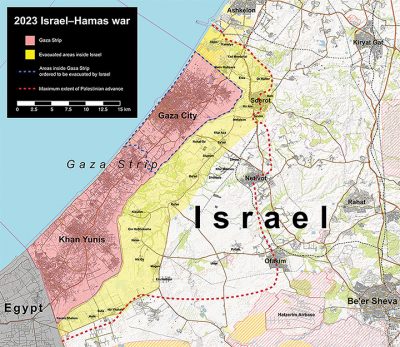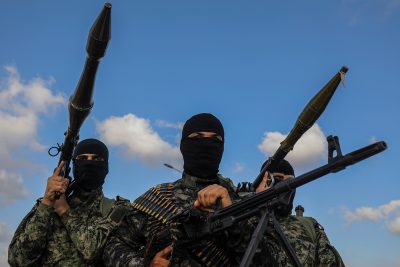×


We have detected your country as:
Please click here to go to the USA website or select another country from the dropdown list.
by: Cheryl Hauer, International Vice President
We’ve heard it again and again. The events of October 7 are indelibly imprinted on the minds of countless people the world over. We’ve read about the atrocities, seen the videos and heard the gut-wrenching testimonies of survivors, released hostages and the families of those who are still in captivity. And we wonder, is there any nation on earth that would not have responded the way Israel has?
Yet Israel’s motives are challenged, and it is suggested that this is not a just war. Israel’s commitment to dismantle Hamas, accusers say, is based on nothing more than a desire for revenge. It isn’t though. Jewish law actually forbids war for any other reason than as a response to the actions of enemies that threaten the survival of the Jewish nation.
 But isn’t Jerusalem’s response overly forceful, criticizers ask. If we are to understand Israel’s reaction to the horrific October 7 massacre, it is imperative that we understand the history of terror that has been the reality of life for Israeli’s since well before statehood.
But isn’t Jerusalem’s response overly forceful, criticizers ask. If we are to understand Israel’s reaction to the horrific October 7 massacre, it is imperative that we understand the history of terror that has been the reality of life for Israeli’s since well before statehood.
Simply put, hatred for Jews is at the heart of what has been called the longest conflict in modern history. It stretches beyond the 19th century with reports of cross-border attacks and local massacres even in the 18th century, well before the birth of the modern state. In the 20th century, with the influx of European Jews and the establishment of mandatory Palestine, such incidents increased in number. The Arab riots of 1929 precipitated the massacre of 67 innocent Jews in Hebron alone, where Jews had lived for centuries. In fact, the October 7 assault is eerily reminiscent of the actions of the 1929 rioters that resulted in the horrific and violent deaths of 133 Jews across the nation and are viewed by some as the “point of no return” in relations between the two populations.
With the formation of the Arab League in 1945, that hatred of Jews was solidified and politicized. The League—with Egypt, Iraq, Jordan, Lebanon, Saudi Arabia, Syria, and Yemen as members—set about making “from the River to the Sea” a reality. Its member states vehemently opposed the UN partition plan of 1947 and coordinated the invasion of Israel, marking the start of the War for Independence in 1948.
The League has since been key in promoting the “Palestinian cause,” and in the past, has belligerently refused negotiations for a settlement to the Arab–Israeli conflict. They have supported Palestinian leaders in promoting hatred of the Jewish people through a constant flow of disinformation to both the Palestinian people and the nations. And they have helped to create an education system that teaches young Palestinians to hate Israel and trains them in activism that glorifies death.
In 1948, the unbridled joy of the worldwide Jewish community at the declaration of Israeli statehood was short-lived. Within 24 hours, the armies of five Arab League members attacked the fledgling state, instigating a bloody war for independence. After nearly 10 months of fighting, Israel emerged as victor—but the cost was high. Over 6,000 Jews lay dead and over 15,000 were injured.
Since that time, Israel has been on a constant quest for peace. However, partners for peace have been in short supply. The state has been involved in six wars since the War of Independence, none of which were wars of aggression. In every circumstance, Israel acted within the parameters of Jewish and international law in responding to increasing threats from her Arab neighbors who overtly call for her destruction.
In addition to those wars, Israel has been forced to carry out military operations in response to terrorist incursions and the murder of innocent civilians. From 2008 to 2022, five such operations were conducted, including Cast Lead, Pillar of Defense, Protective Edge and Guardian of the Walls, all of which were in response to thousands of rockets launched from the Gaza Strip, killing and terrorizing the citizens of southern Israel.
As political leaders and diplomats struggled to find peaceful solutions through the Oslo Accords, the First Intifada (violent uprising) raged, killing over 200 Israelis and injuring over 3,000. Then came the Second Intifada, resulting in the deaths of 1,100 Israelis between 2000 and 2005.
According to the Jewish Virtual Library, the period from 1993 to the present has seen over 4,000 Israelis dead at the hands of Hamas and other terrorist organizations. Attacks on Israelis from suicide bombings and rockets to stabbings and car rammings have occurred in 69 of Israel’s short 75-year life span. That means any Israeli aged 75 years has known only six years that were free of terror. Worse still, Israelis born after 1968 have never experienced a year of peace in their lifetimes.
It would be almost understandable if Israel’s commitment to destroy Hamas was based on a thirst for vengeance. But this is not a war of retribution. It is a battle between good and evil. And make no mistake, it is evil.
Do we think that Hamas did not know how Israel would react to the slaughter of people in their beds and at their breakfast tables? Do we think they didn’t realize what would happen in Gaza when Israel responded? Or did the thought never cross their minds that they were putting millions of innocent Gazans’ lives at risk?
The answer is simple. Of course Hamas did. But they did not care. They bated Israel into this war, a war that Israel did not want, that Israel has been trying to avoid for decades. And the goal of Hamas and its radical Islamic network is not just the destruction of Israel, but the annihilation of Christians as well, followed by the establishment of global Islamic rule.
Israel is fighting a war for survival, and for all our sakes, it is a war she has to win.
Photo Credit: Click on photo for photo credit
Photo License: Map of Gaza Strip
All logos and trademarks in this site are property of their respective owner. All other materials are property of Bridges for Peace. Copyright © 2025.
Website Site Design by J-Town Internet Services Ltd. - Based in Jerusalem and Serving the World.